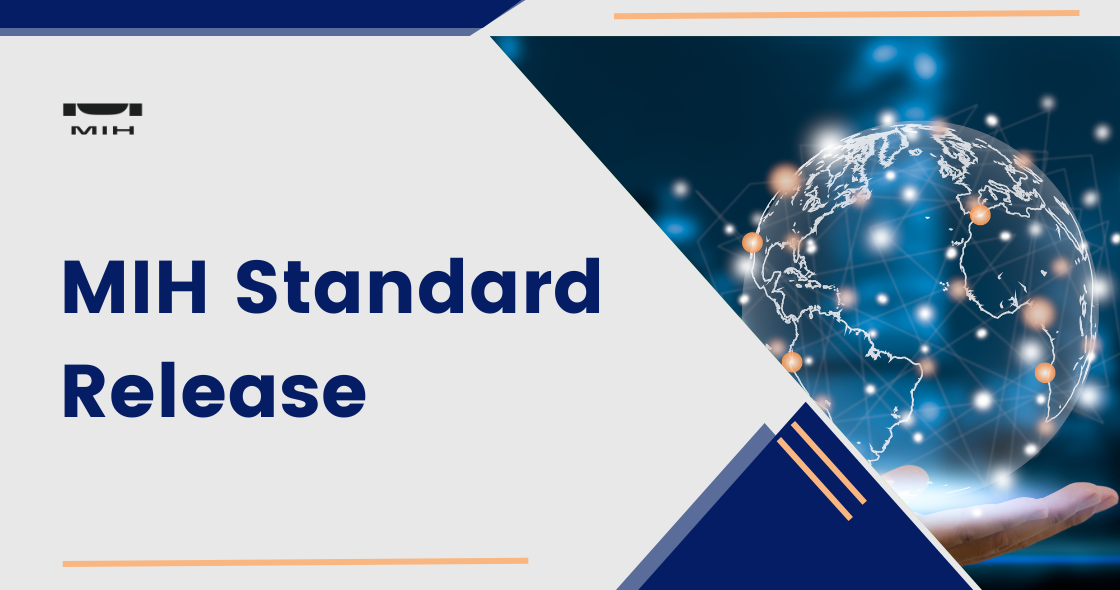Progress update of the MIH Working Groups in September are as below:
👉MIH Member Services Introduction
👉Learn More about MIH Working Groups
MIH Open Platform was finalized in the first version of the EEA topology for go to market solution this month. And one of the highlights is the modularization of ECU solution. The platform is clarifying the whole vehicle feature list in order to modularize ECU functions and reduce development and manufacturing costs. The platform is expected to complete the final version of the EEA's ECU and communication messages in the next few months and open it to contributor members. The feature list and ECU functions currently being clarified include the following subsystems:
Vehicle Control system
Driver Assistance system
Smart Cabin system
Network Topology
Body Control system
MIH will complete the specifications of the communication interface and message based on features of these systems.
MIH WG will focus on reference design and design standardization for
A segment passenger EV powertrain
Commercial EV powertrain
Need members to participate in:
New ideas
Assembly or component R&D
Provide production capacity in each market place
Powertrain WG monthly meeting on 9/20 discussed:
Notice of exhibition activities: MIH is setting its sights on the renowned Consumer Electronics Show (CES) in Las Vegas next January. We're excited to introduce our Project X Concept Car and the cutting-edge MIH Smart Transportation solution to global audiences.
Reference design: GVW3.5t two-speed e-beam axle:
The E-beam axle have completed all assembly at GTG.
Through the compact design, we can keep the single speed and 2-speeds powertrain with similar size & weight.
Powertrain design standardization results:
For cost and space concern, we will choose the 3in1(OBC/DCDC/PDU) for EMS, and powertrain is 3 in1(inverter+motor+gearbox) or coaxial powertrain type.
The main battery is swappable and fixed type, 1piece for 3seater and 2 pieces for 6seater.
For the 2-speed e-beam axle, the inverter will separate from the motor, to decrease vibration wear and reduce unsprung weight.
In Security & OTA WG, we keep on discussing “How to defend your business from cyberattacks with Zero Trust? A comprehensive approach against cyberattacks”. Thanks to SGS they will help to review and improve the paper from certification and regulation. Welcome any partner to contact us to join the discussion.
This month, the team has drafted data fields for the POC phase of driving behavior analysis. By analyzing drivers' behavior and habits, we aim to better assist fleet management and enhance flexibility in determining insurance grade levels. Additionally, discussions were held regarding the underlying architecture of blockchain, wallet applications, and UBI auto insurance execution plans.
MIH held the 23rd and 24th meetings of the Smart Cabin Working Group on August 31 and September 14. In previous meetings, we had initially completed the HAL layer of all API definitions for each Domain function. Next, refer to the Smart Cabin architecture and define the UX API interface based on UX user experience.
The reference architecture defines the HVAC UX API for air conditioning system control. The HVAC ECU is controlled through the HVAC UX API and HAL layer to achieve a comfortable cabin temperature and heating and cooling environment. and Media player UX API multimedia control. Through the HVAC UX API, it can control and adjust the system platform and get multimedia information. It can achieve multimedia control functions through standard settings or customized adjustments.
The Smart Cabin Working Group will continue to advance the development of other APIs and will also confirm feedback and discuss corrections.
The Testing & Certification Working Group convened its 28th meeting. During the meeting, ARTC (Automotive Research & Testing Center) was invited to share information about the TNCAP (Taiwan New Car Assessment Program). TNCAP aims to provide consumers with comprehensive vehicle safety information and encourages automobile manufacturers to develop safer active and passive features. This initiative is to reduce road accident casualties. The sharing session provided the working group members with a better understanding of the TNCAP system and will play a role in advancing future projects.
This month, the team made significant progress in the Carbon Inventory Framework POC project launched in May. Partners have now completed the carbon inventory inspection certification, and we plan to apply this data for real-world testing on our carbon management platform, verifying its efficiency and accuracy. Additionally, we have updated regulatory policies on carbon management from various countries to ensure our carbon management strategies and tools are aligned with the latest international standards and regulations.
This month, the team formally signed an MOU with MIH for the development of vehicular satellite user terminals. This collaboration signifies our ability to better apply low Earth orbit satellite technology in the electric vehicle mobility domain. It not only enhances the communication efficiency of the vehicles but also brings added convenience and new features for users.
The Autonomy Working Group continues to explore solutions for the coexistence of L2+ (partial automation) and L4 (high automation) systems this month. The goal is to enable the safe and efficient coexistence of these two different levels of autonomous driving technologies, including aspects such as sensor sharing, decision-making, and operational control. We aim to further reduce the deployment costs of L4 systems while ensuring safety.

MIH Consortium
2024-08-30

MIH Consortium
2024-08-30

MIH Consortium
2024-08-30